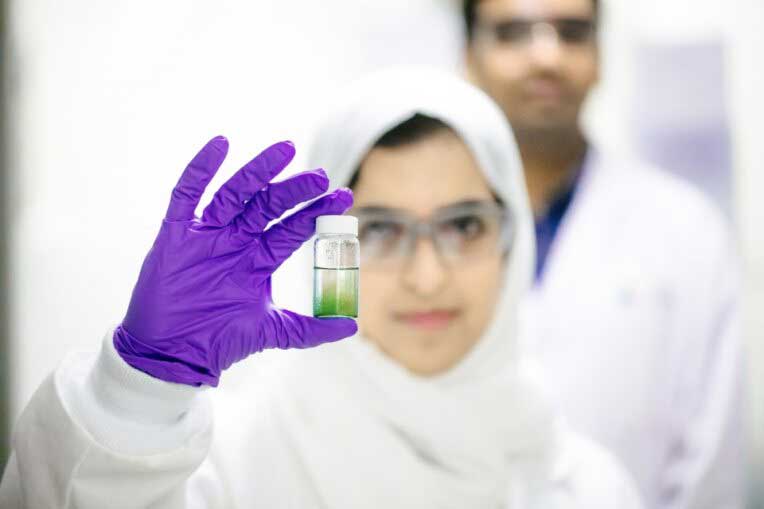Saudi Arabia's rising scientific talents honored with KAUST's 2024 Ibn Rushd Fellowship

King Abdullah University of Science and Technology (KAUST) takes great pride in announcing its distinguished 2024 cohort of Ibn Rushd Fellows: Abrar Aljahani, Abdulrahman Aljurbua, Ahmed Alahmed, and Yara Alshwairikh. These early-career researchers have been chosen for their remarkable scientific achievements and research proposals that resonate with the Kingdom's research and innovation goals. KAUST will provide each recipient with a generous stipend to pursue their cutting-edge postdoctoral research overseas, with the opportunity for annual renewal for up to three years.
A KAUST master's alumna, Abrar Aljahani is currently a Ph.D. candidate at the Max Planck Institute for Multidisciplinary Sciences in Germany. Her research focuses on developing ultra-high-resolution techniques to visualize gene regulation in unprecedented detail. During her Ibn Rushd Fellowship at Stanford University, Aljahani intends to advance super-resolution methods to observe DNA conformations at the nanoscale level. Her work aims to decipher the mechanisms of gene regulation during development, ultimately leading to a better understanding of genetic disorders.
Abdulrahman Aljurbua, a doctoral graduate in electrical and computer engineering from the University of Michigan, Ann Arbor, develops radar system algorithms and techniques for subsurface detection and assessment. As an Ibn Rushd Fellow at Caltech, Aljurbua will focus on developing tools for modeling, visualization and data processing for space-borne imaging radar systems. His work aims to advance earth surface monitoring capabilities, addressing crucial challenges such as monitoring aquifers, vegetation and mineral resources.
A Ph.D. candidate in electrical and computer engineering with a minor in economics at Cornell University, Ahmed Alahmed leverages optimization, economics and AI to analyze electrical distribution networks and drive clean energy adoption. Through the Ibn Rushd Fellowship, Alahmed will continue his research at MIT with a focus on the Saudi Arabian energy grid. There, he will develop models to understand prosumer behavior with integrated distributed energy resources (like photovoltaics and batteries). This research will not only improve our understanding of grid resilience and inform economic policy but also be crucial for a sustainable energy transition.
Yara Alshwairikh, a Ph.D. candidate at Yale University's School of the Environment, is a KAUST alumnus with a master's degree and a background as a KAUST Gifted Student Scholar. Her research focuses on vertebrate adaptation to extreme temperatures. The Ibn Rushd Fellowship will support her postdoctoral studies at the renowned American Museum of Natural History, where she will investigate how climate change impacts reptiles in Saudi Arabia using a multi-disciplinary approach that integrates thermal physiology with species distribution modeling and genomics. The findings will be instrumental in laying the groundwork for vital conservation efforts in the Kingdom.
Though the Ibn Rushd Fellows conduct their postdoctoral research at renowned institutions abroad, KAUST plays an active role in supporting their professional advancement. The University appoints a dedicated KAUST faculty member as a mentor for each fellow, enabling regular consultation and mentorship. Concurrently, KAUST fosters the fellows’ ties with the Kingdom's thriving research and innovation landscape, ensuring their continued integration within this dynamic ecosystem.
“The Ibn Rushd Fellowships are a testament to KAUST’s unwavering belief in the boundless potential of our nation’s talent. By empowering our fellows to explore their scientific passions, we are cultivating a generation of visionary leaders who will spearhead the Kingdom’s drive to the forefront of global innovation,” said Osman Bakr, chair of the Ibn Rushd Program.
The Ibn Rushd Fellowship Program is one of KAUST's many efforts to nurture young Saudi talent into future leaders in science and academia. It is named after the brilliant 12th-century Islamic polymath, also known as Averroes, who made influential contributions to many fields, including philosophy, medicine, law, mathematics, and astronomy. His scholarship laid the groundwork for the Renaissance.

